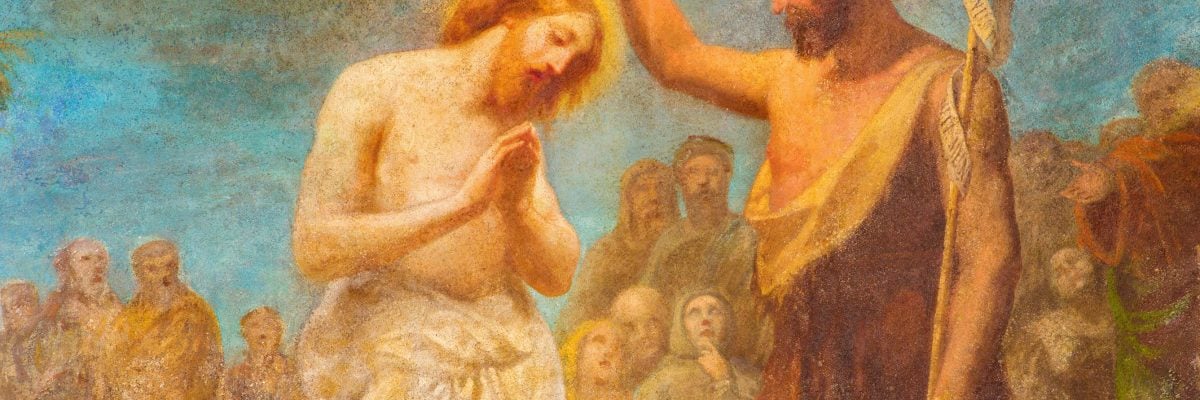
Homily for the Second Sunday of Advent, B Cycle
The beginning of the gospel of Jesus Christ the Son of God.
As it is written in Isaiah the prophet:
Behold, I am sending my messenger ahead of you;
he will prepare your way.
A voice of one crying out in the desert:
“Prepare the way of the Lord,
make straight his paths.”
John the Baptist appeared in the desert
proclaiming a baptism of repentance for the forgiveness of sins.
People of the whole Judean countryside
and all the inhabitants of Jerusalem
were going out to him
and were being baptized by him in the Jordan River
as they acknowledged their sins.
John was clothed in camel’s hair,
with a leather belt around his waist.
He fed on locusts and wild honey.
And this is what he proclaimed:
“One mightier than I is coming after me.
I am not worthy to stoop and loosen the thongs of his sandals.
I have baptized you with water;
he will baptize you with the Holy Spirit” (Mark 1:1-8).
St. John the Baptist was so wonderful and great in the eyes of the people of Israel that it was hard for them to decide if Jesus was even greater: the Christ, the Anointed One, the Messiah of the Jews. John was an ascetic, celibate, and pure like the Nazarites of old who lived a life of abnegation and penance and expectation of the immediate arrival of the Savior. He had been a boarder in the desert with the Essenes in Qumran, taught to live in constant expectation of the coming of the Holy One of Israel.
Jesus, the son of Mary, and also called the son of Joseph, lived a quiet, normal life. He lived and worked and rested and celebrated with the normal people of Nazareth and Galilee, his home region, following the normal rites and observances of the Pharisees. No one noticed him, and he did not catch anyone’s attention until he was baptized by his cousin John in the Jordan River.
These were apparently very different men. John was a clearly prophetic and ascetic figure; Jesus was not at all ascetic, as his critics would later bring forth, but he was full of wonders and healings and deliverances.
Which kind of life are Christians supposed to follow? Are we supposed to be austere, fasting, abstaining from drink, living apart? Or are we supposed to be socially normal, affable, eating and drinking like everyone else?
This has been a problem in Christian history, especially if we consider the influence on Christianity of the various movements that have promoted abstinence from drink, and various other ascetic practices like fasting, not eating meat, not dancing or playing cards, and so on. The problem is that the moment someone is stricter than someone else, he gets a moral advantage and makes anyone who disagrees with him seem to be a slacker, a laxist, a less-than-perfectly-moral person. Then those others begin to get defensive and start to minimize the importance of penance and self-denial. One extreme begets another.
But Jesus the Savior and his forerunner John the Baptist were different. They were not competitors in the holiness contest. The Baptist led a life of austerity, denying himself the usual comforts of human social life. He was not the sort you would invite to a dinner party. The Savior led a life that observed only the normal requirements of the old law, the fasts and feasts of the people of Israel, and even then he justified his followers’ gleaning of grain on the Sabbath (Matt. 12:1-13).
The fact is that even the life of Jesus the Son of God would not be enough to demonstrate every form of Christian life that is helpful or needful for the human race. St. Thomas Aquinas teaches that for this reason we have the example of both Jesus and John, so that the hard ascetical route may not be abandoned by Christians and that the hopeful and merciful concessions of the Savior may not be abandoned, either.
Thomas teaches in his Summa that the effects of austerity that are natural in the spiritual life can also be accomplished by the immediate contact with the sacred humanity of Christ Jesus, who is able to bring about the same spiritual effects by the very power of his divine nature:
Just as by abstinence other men acquire the power of self-restraint, so also Christ, in himself and in those that are his, subdued the flesh by the power of His Godhead. Wherefore, as we read Matthew 9:14, the Pharisees and the disciples of John fasted, but not the disciples of Christ. On which Bede comments, saying that “John drank neither wine nor strong drink: because abstinence is meritorious where the nature is weak. But why should our Lord, whose right by nature it is to forgive sins, avoid those whom he could make holier than such as abstain?” (III, Q40, A2, ad. 2).
This is a beautiful truth: that even if we have not been so penitent and austere as to do great penance, that the Lord himself will, by the power of his divinity, accomplish such good things in us as would have been accomplished otherwise by penance.
The fruit of this consideration is simply that we should have constant recourse to the sacred humanity of the Savior in the Blessed Sacrament. He will heal and uplift and perfect all of our faults and sins by the power of the same human nature with which he instructed and corrected his disciples.
Yet, in the meantime, as we reflect on how good the Lord has been to us, we might also consider how we should be more generous in doing penance and denying ourselves.
May St. John the Baptist, whom the Church invokes in each and every Mass in the Roman Canon and then Confiteor, obtain for us the grace to love the Savior in his mild mercy and kindness to us as we seek to prepare for his coming!



